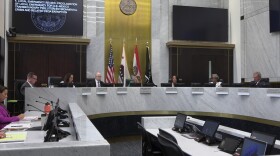The economy and job creation have strengthened enough for the Federal Reserve to end its $600 billion Treasury bond-buying program in June as planned, the Fed signaled Wednesday.
Ending a two-day meeting, the Fed made no changes to the program. The decision was unanimous. The bond purchases were intended to lower loan rates, encouraging spending and boost stock prices. But critics worried that the purchases would feed inflation.
The Fed downplayed inflation risks in its statement. It acknowledged a spike in oil prices, but concluded that the pickup in inflation will be temporary.
"Inflation has picked up in recent months, but longer-term inflation expectations have remained stable and measures of underlying inflation are still subdued," the Fed said.
It said "the economic recovery is proceeding at a moderate pace and overall conditions in the labor market are improving gradually."
Later Wednesday afternoon, Fed Chairman Ben Bernanke is scheduled to hold the central bank's first full-fledged news conference.
As it winds down its economic support programs, the Fed is shifting its focus on when and how it should start boosting interest rates to prevent inflation from getting out of control. Economists think the Fed will start raising rates later this year or early next year. Higher rates would reduce borrowing and spending and make companies less inclined to boost prices.
The Fed offered a mostly upbeat assessment on the economy. It said that the economic recovery is proceeding at a "moderate pace" and hiring is improving gradually. Consumers and businesses also are spending enough to support the recovery, the Fed said.
But the Fed's statement also pointed to weak spots in the economy. It noted that the housing market remains "depressed."
To nurture the recovery, the Fed also kept a pledge to hold its key interest rate at a record low near zero for an "extended period." The Fed has kept rates at ultra-low levels since December 2008.
Even though the bond-buying program is scheduled to end in June, the Fed said it's continuing a separate support program: It's reinvesting about $17 billion a month in proceeds from its portfolio of mortgage securities to buy Treasury debt. That should help keep rates low on mortgages and other consumer loans.
Since the Fed's bond-purchase program was announced in early November, the economy has gained strength. The unemployment rate has dropped to 8.8 percent, a full percentage point. Companies have added more than 200,000 jobs for two straight months the first time that's happened in five years. And the S&P 500 index has surged 28 percent over the past eight months. Rates on 30-year mortgages have dropped and now stand at 4.80 percent.
Copyright 2022 NPR. To see more, visit https://www.npr.org. 9(MDAzMjM2NDYzMDEyMzc1Njk5NjAxNzY3OQ001))





